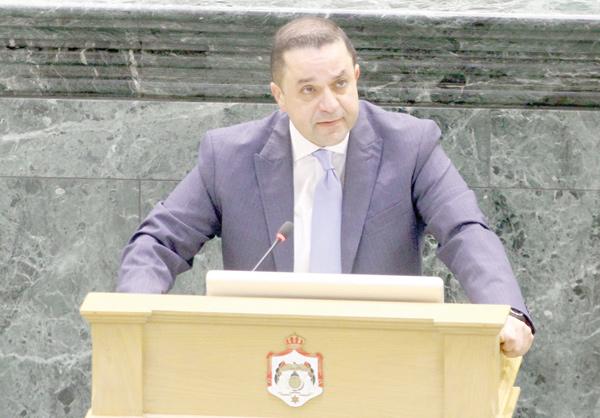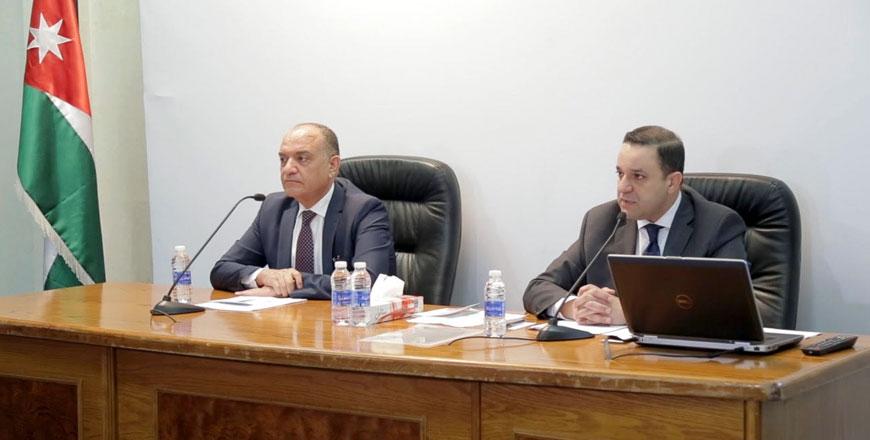You are here
Gov't presents draft budget law to Lower House
By Raed Omari - Dec 09,2019 - Last updated at Dec 09,2019

Finance Minister Mohamad Al-Ississ presents the 2020 draft state budget law to the Lower House on Sunday (Photo by Hasan Tamimi)
AMMAN — The government on Sunday presented the 2020 draft state budget law to the Lower House, with an estimated deficit of JD1.247 billion after foreign grants.
Reading a detailed report before lawmakers, Finance Minister Mohamad Al-Ississ said that current expenditures are expected to reach JD8.383 billion with an increase of JD414 million from 2019.
He said that 65 per cent of the current expenditures will go as salaries for serving and retired civil and military employees.
Al-Ississ said that the value of capital spending in 2020 is estimated at JD1.425 billion, registering an "unprecedented" increase of 33 per cent.
The minister said that the 2020 draft state budget law saw a rise in domestic revenues to reach JD7.754 billion, registering an increase of 10.4 per cent from the JD7.021 billion reestimated in 2019.
Foreign grants are expected to reach JD807 million in 2020, the same as the reestimated value in 2019, the minister said.
Al-Ississ explained that the deficit in 2020 budget is estimated to reach JD1.247 billion after grants, up from JD1.215 billion in the reestimated value for 2019.
Before grants, next year’s deficit was estimated in the law at JD2.054 billion, or 6.4 per cent of GDP, compared with JD2.018 billion of the reestimated deficit in 2019, constituting 6.5 per cent of GDP.
According to the law, tax revenues are expected to increase by JD853 million to JD5.651 billion compared with JD4.798 billion reestimated for 2019, while non-tax revenues are expected to see a 5.4 per cent drop to JD2.103 billion in 2020, down from the JD2.223 billion reestimated for 2019.
Despite regional turbulence and the global recession, the minister said that Jordan’s economy has proved resilient and acted as a model for containing crises. He added that Jordan’s debt has increased by JD12 billion over the past 10 years as a result of regional turbulence and other external factors.
To address economic challenges facing Jordan, the minister said that the government will prepare a national programme for economic and financial reform.
Al-Ississ said that the reform programme will be fully prepared by Jordanians and the outcome of a nationwide dialogue.
He said that Jordan has embarked on talks with the International Monetary Fund (IMF) on a new programme to stimulate growth through addressing structural imbalances in some economic sectors to help create jobs, obtain soft loans and grants to reduce the overall public debt and increase the competitiveness of the national economy.
The minister said that the IMF has demonstrated “positive reaction” towards the national programme, adding: “We will be clear and there will be no tax hikes and there is no alternative to improve the living standards of Jordanians and lower unemployment rates while maintaining fiscal stability.”
IMF’s Director of the Middle East and Central Asia Department Jihad Azour described its relationship with Jordan as “deep” during the global lender’s annual fall meeting in Washington in October.
“We have been supporting Jordan with two consecutive programmes. In addition to our support, we were able to mobilise the international assistance that Jordan needs,” Azour said.
Related Articles
AMMAN — The Lower House on Tuesday continued its deliberations over the 2020 state budget draft law and the budgets of independent public in
AMMAN — The Senate on Wednesday endorsed the 2020 state budget bill and the draft law governing the budgets of independent public institutio
AMMAN — The 2020 draft state budget law saw a rise in domestic revenues to reach JD7.754 billion, registering an increase of 10.4 per cent f

















